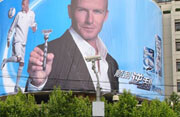David Beckham, the glamorous face of international sport, recently announced that he will cross the Atlantic to play soccer in America. At 32, it is widely acknowledged that the English superstar's best days are behind him. Nevertheless, the Los Angeles Galaxy will pay him an incentive-laden compensation package estimated to be worth $250 million. It was said that Tommy Lasorda, the long-time manager of the Los Angeles Dodgers, was so loyal to his team that he "bled Dodger blue." These days, it often seems that the only color that matters in sports is green.
"David Beckham is a sports marketer's dream—talented, photogenic and with a pop-star wife," London-based entertainment lawyer Alex Chapman recently told www.thisismoney.co.uk. As the world's most famous footballer, "Beckham typifies the importance of commercial factors in modern sport."
Lately, commercial factors have driven sports teams to cast a wider net for talent, fans, and market power. If you could peek inside their corporate playbooks, you would find that most sports franchises are searching for ways to globalize their brands. Buying a proven star like Beckham is the short route to international exposure. But many teams are opting for a more organic approach.
"To continue to grow, you have to have an international business presence," Pete Abitante, senior director of international public affairs for the National Football League (NFL), recently told The Boston Globe. The NFL hopes to feature a Chinese-born placekicker in an exhibition game in Beijing this August. The New York Yankees also recently announced plans to establish a beachhead in the Chinese market. The team will soon open baseball training academies in China with the hope of identifying and developing young talent. "We hope to have our coaches, trainers, scouts here within just a few months,'' club President Randy Levine said at a press conference in Beijing.
British author Nick Hornby describes the unique efficiency of the global market for sports talent in his 1992 memoir of football obsession, Fever Pitch. "One of the great things about sport is its cruel clarity: there is no such thing, for example, as a bad one-hundred-metre runner, or a hopeless centre-half who got lucky; in sport, you get found out. Nor is there no such thing as an unknown genius striker starving in a garret somewhere, because the scouting system is foolproof."
Unlike in some industries, a high degree of skill appears to be the sole barrier to entry into the global market for sports talent. London football club Arsenal currently employs players from Belarus, Brazil, Cameroon, Côte d'Ivoire, and Sweden. In fact, there are only a handful of British-born players on the team's roster.
"I can imagine that all Arsenal's players in a few years might be African," Hornby recently told Policy Innovations. "[T]he global talent search…has become more and more serious and thorough—a club can save themselves an awful lot of money by finding a young African kid."
And a club can make itself an awful lot of money by establishing a presence in the developing markets of Africa, Asia, and India. A study commissioned last year by the World Federation of the Sporting Goods Industry estimated the size of the global sports apparel market at $235 billion annually. Signing an international superstar like Beckham can generate astronomical revenue from merchandise sales, sponsorship deals, and advertising. Beckham's current club, Real Madrid, saw its annual advertising income increase nearly 140 percent in the years following his arrival in Spain. Sales of the team's replica jersey spiked by 60 percent during the same period.
The Los Angeles Galaxy undoubtedly hopes to replicate the marketing successes of Real Madrid, the Yankees, and other big sports franchises that have global name recognition. Closer to home, however, Beckham's bulging paycheck could potentially become a source of friction. His earnings will dwarf the combined salaries of every other player in Major League Soccer. As with globalization generally, outsized gains accruing to one firm, individual, or country can generate deep skepticism.
"Some fans are saying [Beckham] just came here to sell T-shirts and Pepsi Cola. But if he plays well, they'll end up falling in love with the Galaxy," says Rafael Ramos Villagrana, a soccer columnist for La Opinión, a Spanish-language newspaper in Los Angeles.
John Bale, professor emeritus of sports studies at the Keele University, UK recently discussed the possible fallout from Beckham's huge salary with Policy Innovations. "In the UK it has already been mooted that his colleagues will feel bitter about the gap between his and their remuneration," said Bale, author of Roger Bannister and the Four-Minute Mile and Imagined Olympians. "[I]t could be argued to be unethical. It could also reflect market forces."
Bitterness about the occasionally lopsided benefits of globalization is not uncommon—just ask an Ethiopian coffee farmer. Rent-seeking behavior, whether by firms or individuals, provides ready fuel for globalization's most ardent skeptics. But globalization can also be a force bringing cultures together.
"I know only a few words of Russian. I communicate with most of my teammates with gestures, but it's working out," says Vagner Silva de Souza. The Russian club CSKA Moscow recently paid an estimated $8 million to buy the contract of the Brazilian striker better known by his nickname, Vagner Love. The 22-year-old's colorful dreadlocks and penchant for blowing kisses to the crowd have endeared him to local fans and created an unlikely link between two very different cultures.
Sports metaphors such as the level playing field, good sportsmanship, and teamwork have long informed popular notions of fairness. But for all of the attention generated by Beckham's decision to emigrate, some observers doubt that other top players will be inspired to follow suit.
"The size of his pay-packet might tempt a few," Hornby said. "But going to America will mark the end of a [soccer] career for quite a few years yet."





